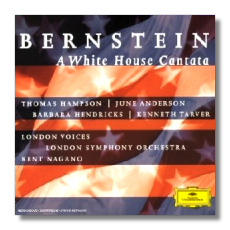
The Internet's Premier Classical Music Source
Related Links
- Bernstein Reviews
- Latest Reviews
- More Reviews
-
By Composer
-
Collections
DVD & Blu-ray
Books
Concert Reviews
Articles/Interviews
Software
Audio
Search Amazon
Recommended Links
Site News
 CD Review
CD Review
Leonard Bernstein

A White House Cantata
- Thomas Hampson (President)
- June Anderson (First Lady)
- Barbara Hendricks (Seena)
- Kenneth Tarver (Lud)
- Victor Acquah (Little Lud)
- Keel Watson (Henry)
- Neil Jenkins (Admiral Cockburn)
London Voices
London Symphony Orchestra/Kent Nagano
Deutsche Grammophon 463448-2 80:07
Summary for the Busy Executive: Of thee I sing, Baby.
Recently, I seem to have written a lot about works brought back from oblivion - works by major, sometimes repertory, composers. In many even relatively recent cases, the rescue effort hasn't completely succeeded. Chunks of works have disappeared, probably for good, which leaves posterity with scraps. The fragility and, above all, the blind luck of survival strike me yet again. Those who go on about how a masterpiece survives because it is a masterpiece have forgotten not only about Bach's St. Mark Passion but about "Mairzy Doats" as well.
1600 Pennsylvania Avenue, a musical by Bernstein with lyrics by Alan Jay Lerner, opened and closed on Broadway after an embarrassingly short run, if we consider the star-power of those two names. Bernstein worked on it for four years (1972-76) and produced more music for it than for any other theater work. This suggests that the aim and shape of the work never really gelled in the creators' minds. It became known as "the show that got away." Bernstein compiled scenes from the musical and created A White House Cantata. Some of the music or at least some of the musical ideas found their way into other works, notably Songfest and the Divertimento.
What emerges is very Sondheim-like work, a superior Brechtian vaudeville (I kept thinking of the brilliant Pacific Overtures from the same year, 1976), functioning at a level so far above the Broadway musicals of that time and ours (excepting Sondheim) that thoughts of the artistic brain-death of the Broadway audience, including the critical audience, easily find root in one's mind. How could this work have been so dismissed? The music alternates between gorgeous and dazzling. The lyrics are finely wrought. The passion of the work isn't the all-too-easy Broadway "heart." The show's creators assumed that the audience had a mind and would take pleasure in following (and even disagreeing with) an argument. Apparently they were mistaken. The characters stand up as mostly pasteboard: a succession of Presidents, vainglorious, idealistic, and morally confused all at once, and all played by one actor (the President); the First Lady, generally seen as the Conscience of the Country; and the Black servants, repressed and patronized. It's the music that engages us, that invests these placards with surprising humanity, that turns an elementary civics and history lesson into something we have to care about.
Like late Gershwin and in accordance with his own previous practice (Candide, West Side Story), Bernstein tends to compose not songs, but entire scenes. Yet, he can still knock out a great tune when the libretto demands it. If people know anything from the show, it's probably "Take Care of This House," a stately three-quarter-time song which has appeared on various Bernstein tribute CDs and collections of fugitive pieces. But there's also the stirring "To Make Us Proud" and a lively duet, "Lud's Wedding." Still, the scenes do most of the heavy lifting in the work. The "Sonatina," about the British capture of the White House, brilliantly plays with "The Star-Spangled Banner." The equally-brilliant "Duet for One" (the First Lady plays both Julia Grant and Lucy Hayes) portrays the dashed hopes of blacks during Reconstruction and the beginning of Jim Crow. "The Money-Lovin' Minstrel Show" (the GOP, the party of Lincoln, bought and paid for) still has relevance, unfortunately, except that now the rot has spread pretty much across the aisle as well. The most dated part of the work, and the saddest, is the idealism both composer and lyricist maintain - that we can fix things if only our hearts and minds were in the right place. I'd love to believe this, but at this point it's a bit like believing "All You Need Is Love."
Kent Nagano does a terrific job, delivering a very MTT-like performance of Bernstein. The singers are good, even solid, but no one performer stands out, with the exception of June Anderson, an experienced Bernstein hand, as the First Lady. The recorded sound is as rich as cream.
Copyright © 2004, Steve Schwartz


















